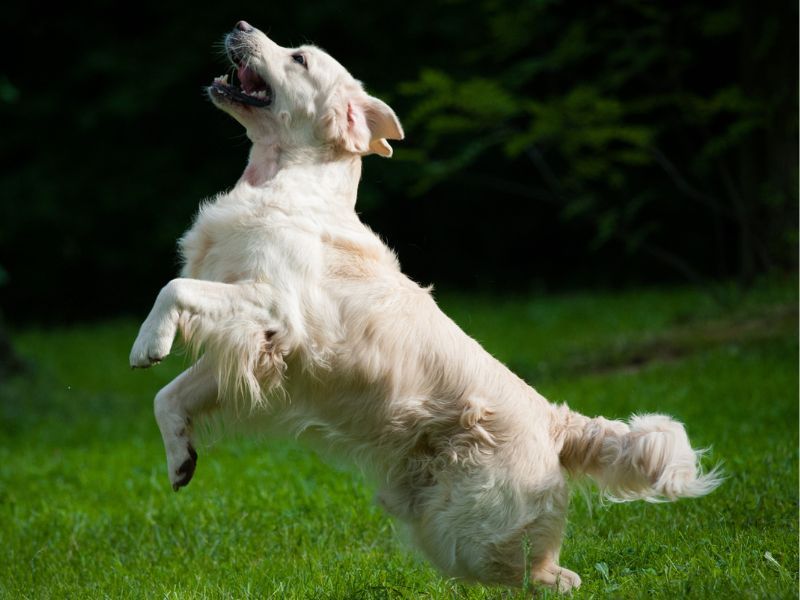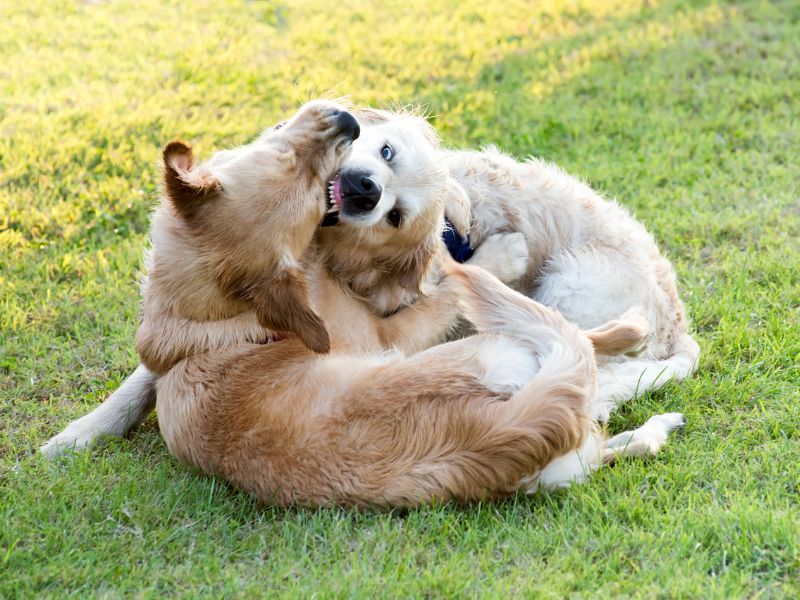Golden Retrievers are one of the most popular dog breeds in the world, and for good reason. They are friendly, loyal, and make great family pets. However, like any breed, Golden Retrievers are not immune to behavior problems. These problems can range from minor annoyances to serious issues that require professional help.
One common behavior problem in Golden Retrievers is excessive barking. This can be caused by a variety of factors, including boredom, anxiety, or a lack of socialization. Another common problem is destructive chewing, which can be caused by teething, boredom, or separation anxiety. Golden Retrievers are also prone to digging, jumping, and pulling on the leash.
While these behavior problems can be frustrating for owners, they can usually be addressed with proper training and socialization. It is important to understand that these behaviors are not a reflection of the dog’s personality or intelligence, but rather a result of their natural instincts and environment. With patience and consistency, owners can help their Golden Retrievers overcome these behavior problems and become well-behaved, happy pets.
The Truth About Golden Retriever Behavior Issues
Golden Retrievers are known for their friendly and lovable personalities, but like any breed, they can exhibit behavior issues that need to be addressed. Some common behavior problems that Golden Retriever owners may encounter include jumping on people, destructive chewing, separation anxiety, and aggression towards other dogs or people.
It is important to note that behavior issues in Golden Retrievers are not solely due to genetics. Environmental factors such as lack of exercise, poor training, and inadequate socialization can also contribute to behavior problems.
One of the best ways to prevent behavior issues in Golden Retrievers is to provide them with plenty of exercise and mental stimulation. Regular walks, runs, and playtime can help burn off excess energy and prevent destructive behaviors. Training and socialization should also begin at a young age to help prevent aggression and other behavior issues.
If a Golden Retriever is exhibiting behavior problems, it is important to seek the help of a professional dog trainer or behaviorist. They can provide guidance and support in addressing the behavior issue and preventing it from becoming a long-term problem. With proper training and care, most Golden Retriever behavior issues can be resolved.
How To Stop Bad Behavior In Your Golden Retriever
Golden Retrievers are known for their friendly and obedient nature, but they can develop bad behavior if not trained properly. Here are some tips to stop bad behavior in your Golden Retriever:
1. Positive Reinforcement
Positive reinforcement is the best way to train your Golden Retriever. Reward your dog with treats, praise, or toys when they display good behavior. This will encourage them to repeat the behavior and learn what is expected of them.
2. Remove The Temptation
If your Golden Retriever is displaying bad behavior, remove the temptation. For example, if your dog is chewing on furniture, remove the furniture or cover it with a deterrent spray. If your dog is jumping on people, keep them on a leash or teach them to sit and stay when greeting people.
3. Don’t Reinforce Bad Behavior
Don’t reinforce bad behavior by giving your Golden Retriever attention when they are misbehaving. Instead, ignore the bad behavior and only give attention when they are behaving well. This will teach them that good behavior is rewarded and bad behavior is ignored.
4. Consistency
Consistency is key when training your Golden Retriever. Make sure everyone in the household is using the same commands and training techniques. This will prevent confusion and make it easier for your dog to learn.
By using positive reinforcement, removing temptation, not reinforcing bad behavior, and being consistent, you can stop bad behavior in your Golden Retriever and enjoy a well-behaved and obedient pet.
Are Your Golden Retriever’s Needs Being Met?
Golden Retrievers are a loving and loyal breed, but they can develop behavior problems if their needs are not met. One of the most important things to consider is whether your Golden Retriever is getting enough exercise. These dogs are energetic and need plenty of physical activity to stay healthy and happy. A lack of exercise can lead to boredom, which can cause destructive behaviors like chewing and digging.
In addition to exercise, Golden Retrievers also need mental stimulation. These dogs are intelligent and enjoy learning new things. Training sessions, puzzle toys, and interactive games can all provide mental stimulation and prevent boredom.
Another important aspect of meeting your Golden Retriever’s needs is socialization. These dogs are friendly by nature and enjoy being around people and other dogs. Socialization can help prevent behavior problems like fearfulness and aggression.
Lastly, it’s important to ensure that your Golden Retriever is getting proper nutrition and medical care. A healthy diet and regular visits to the vet can help prevent health problems that could contribute to behavior issues.
By meeting your Golden Retriever’s needs for exercise, mental stimulation, socialization, and proper care, you can help prevent behavior problems and ensure that your dog is happy and healthy.
A Tired Dog Is A Good Dog
Golden Retrievers are known for their high energy levels and need for exercise. One of the best ways to keep a Golden Retriever happy and healthy is to make sure they get enough exercise every day. As the saying goes, “a tired dog is a good dog.”
Regular exercise can help prevent many behavior problems that Golden Retrievers are prone to developing. These problems may include obesity, destructive behavior, separation anxiety, excessive barking, attention-seeking, and leash pulling. Exercise can also help improve a dog’s mental health and reduce stress.
To ensure that a Golden Retriever gets enough exercise, owners should provide daily walks, runs, or playtime. It’s important to tailor the exercise routine to the dog’s age, health, and energy level. Golden Retrievers are active dogs and may require more exercise than other breeds.
In addition to physical exercise, mental stimulation is also important for a Golden Retriever’s well-being. Games like fetch, hide-and-seek, and puzzle toys can help keep a dog’s mind engaged and prevent boredom.
Overall, providing enough exercise and mental stimulation is crucial for a Golden Retriever’s physical and mental health. A tired dog is a happy dog, and a happy dog is a good dog.
Remove The Temptation
To prevent Golden Retriever behavior problems, it is important to remove any temptation. Since Golden Retrievers are known for their love of food, it is important to keep any food or treats out of reach. This means keeping counters clean and free of food, keeping trash cans secured, and not leaving food unattended.
In addition to food, Golden Retrievers may be tempted by items such as shoes, socks, or toys. It is important to keep these items out of reach as well. One way to do this is to keep them in a secure location, such as a closet or drawer. Another option is to provide plenty of toys and chews for the Golden Retriever to play with.
It is also important to provide plenty of exercise and mental stimulation for the Golden Retriever. This can include going for walks, playing fetch, or providing puzzle toys. By providing plenty of exercise and mental stimulation, the Golden Retriever will be less likely to engage in destructive behaviors.
Overall, removing temptation is an important step in preventing Golden Retriever behavior problems. By keeping food and tempting items out of reach, providing plenty of exercise and mental stimulation, and keeping toys and chews readily available, owners can help their Golden Retrievers lead happy and healthy lives.
Give Your Golden Retriever A Job To Do
Golden Retrievers are known for their intelligence, loyalty, and eagerness to please. These traits make them great candidates for jobs that require mental and physical stimulation. Giving your Golden Retriever a job to do can help prevent behavior problems caused by boredom and lack of exercise.
One way to give your Golden Retriever a job is to teach them basic obedience commands like sit, stay, come, and heel. Once they have mastered these commands, you can challenge them by teaching them more advanced commands like roll over, play dead, and fetch.
Another way to give your Golden Retriever a job is to enroll them in agility or obedience classes. These classes provide mental and physical stimulation and can help prevent behavior problems caused by lack of exercise.
You can also give your Golden Retriever a job by providing them with puzzle toys and games. These toys and games challenge your dog’s mind and can help prevent behavior problems caused by boredom.
Overall, giving your Golden Retriever a job to do is a great way to prevent behavior problems and keep them mentally and physically stimulated.
What Are You Reinforcing?
When it comes to addressing behavior problems in Golden Retrievers, it’s important to consider what behaviors are being reinforced. This means taking a closer look at the actions of both the dog and the owner.
For example, if a Golden Retriever is barking excessively, the owner may inadvertently be reinforcing this behavior by giving the dog attention or treats when they bark. Instead, it’s important to only give attention and rewards when the dog is exhibiting desired behaviors, such as being quiet.
Similarly, if a Golden Retriever is jumping on people, the owner may be reinforcing this behavior by giving the dog attention or physical touch when they jump. Instead, it’s important to only give attention and rewards when the dog is exhibiting desired behaviors, such as sitting calmly.
By taking a closer look at what behaviors are being reinforced, owners can begin to address behavior problems in a more effective manner. This may involve using positive reinforcement techniques, such as rewarding desired behaviors with treats or praise, while ignoring or redirecting unwanted behaviors.
Overall, understanding the role of reinforcement in behavior problems is an important step in addressing these issues in Golden Retrievers.
Is My Golden’s Bad Behavior Just Because They’re A Puppy?
Many pet owners believe that their puppy’s bad behavior is just a phase that they will grow out of. While it’s true that some behaviors may improve as a puppy matures, it’s important to address problem behaviors early on to prevent them from becoming ingrained habits.
Puppies are like sponges, soaking up everything around them and learning from their experiences. This means that if they are allowed to engage in certain behaviors, they may continue to do so even as they get older. It’s important to set boundaries and establish rules early on so that your puppy learns what is and isn’t acceptable behavior.
It’s also important to remember that some behaviors may be indicative of a larger issue, such as separation anxiety or a medical problem. If your puppy’s behavior seems extreme or out of character, it’s important to consult with a veterinarian or professional dog trainer to rule out any underlying issues.
In summary, while some bad behaviors may improve as a puppy matures, it’s important to address them early on to prevent them from becoming ingrained habits. Setting boundaries and establishing rules, as well as consulting with a professional if necessary, can help ensure that your puppy grows up to be a well-behaved and happy adult dog.
Common Golden Retriever Behavior Problems
Golden Retrievers are known for their friendly nature, loyalty, and intelligence. However, like any dog breed, they can develop behavior problems that require attention and training. Here are some of the most common behavior problems that Golden Retriever owners may encounter:
Separation Anxiety
Golden Retrievers are social dogs that crave human interaction. When left alone for extended periods, they may become anxious, which can lead to destructive behavior, excessive barking, and other issues. Separation anxiety can be addressed through training and gradual desensitization to being alone.
Leash Pulling
Golden Retrievers are active dogs that enjoy going for walks and exploring their surroundings. However, they may become overexcited and pull on the leash, which can make walks challenging and uncomfortable for their owners. Leash pulling can be addressed through training and the use of a no-pull harness or head collar.
Jumping Up
Golden Retrievers are friendly dogs that love to greet people. However, they may jump up on people, which can be intimidating and even dangerous, especially for children and elderly individuals. Jumping up can be addressed through training and the use of positive reinforcement techniques.
Chewing
Golden Retrievers are known for their love of chewing, which can lead to destructive behavior, especially when they are teething or bored. Chewing can be addressed through training, providing appropriate chew toys, and ensuring that the dog gets enough exercise and mental stimulation.
Aggression
While Golden Retrievers are generally friendly dogs, they may exhibit aggressive behavior towards other dogs or people in certain situations. Aggression can be caused by fear, territoriality, or other factors, and should be addressed through training and, in some cases, the assistance of a professional dog trainer or behaviorist.
Keep in mind that behavior problems can be addressed through training and patience. With the right approach, Golden Retrievers can overcome these issues and become well-behaved and happy companions.
How To Stop Your Golden Retriever From Jumping On People
Jumping on people is one of the most common behavior problems among Golden Retrievers. It can be frustrating for owners and dangerous for guests. Fortunately, there are several effective ways to train your Golden Retriever to stop jumping on people.
One of the first steps in stopping your Golden Retriever from jumping on people is to remove the reward. To your dog, the reward for jumping up is getting attention from you or the person they are greeting. Your dog wants your attention, and jumping up is their way of demanding it. Every time your Golden jumps on someone, that person needs to ignore him completely. Even if they shout “down,” “no,” and/or push him away, negative attention is still attention. The trick is that every single person, 100 percent of the time, needs to do this.
Another way to stop your Golden Retriever from jumping on people is to teach an alternative behavior. Teaching your Golden Retriever an alternative behavior is another excellent way to deter them from jumping. You can teach your dog to “sit” or “stay” when they approach people. Start by practicing this behavior without any distractions. You can then gradually increase the level of distraction, such as having a friend walk by or come into the room.
Exercising your Golden Retriever before they see people they might jump on can also help. This will help tire them out and reduce their energy levels, making them less likely to jump up. You can then redirect them by asking them to sit. One thing you don’t want to do is give them attention or pet them while they’re jumping on you.
Overall, stopping your Golden Retriever from jumping on people requires consistency, patience, and positive reinforcement. By removing the reward, teaching an alternative behavior, and exercising your dog before socializing, you can effectively train your Golden Retriever to stop jumping on people.
How To Stop Your Golden Retriever From Pulling On The Leash
Walking your Golden Retriever can be a fun and enjoyable experience for both you and your furry friend. However, if your Golden Retriever is constantly pulling on the leash, it can quickly become a frustrating and even dangerous experience. Fortunately, with a little patience and consistency, you can teach your Golden Retriever to walk calmly on a leash without pulling.
One effective way to stop your Golden Retriever from pulling on the leash is to use a no-pull harness. Unlike traditional collars or harnesses, a no-pull harness is designed to discourage your dog from pulling by gently applying pressure to their chest. This can help your Golden Retriever learn that pulling on the leash is not a rewarding behavior.
Another important tip is to start leash training your Golden Retriever as early as possible. Even an eight-week-old puppy can learn good leash manners. The sooner you start training, the easier it will be to teach your Golden Retriever to walk calmly on a leash without pulling.
It’s also important to reward your Golden Retriever for good behavior. When your dog walks calmly on the leash without pulling, be sure to give them plenty of praise and treats. This positive reinforcement can help your Golden Retriever learn that walking calmly on the leash is a rewarding behavior.
Lastly, be patient and consistent with your training. It may take some time for your Golden Retriever to learn to walk calmly on the leash without pulling, but with patience and consistency, you can teach your furry friend good leash manners.
How To Stop Your Golden Retriever From Chewing Up Everything
Golden Retrievers are known to be playful and curious dogs. However, their love for chewing can sometimes lead to destructive behavior, especially when they are left alone. Here are some tips to help stop your Golden Retriever from chewing up everything in sight.
Provide Plenty of Toys
One of the best ways to prevent your Golden Retriever from chewing on your belongings is to provide them with plenty of toys to play with. Make sure to choose toys that are safe and durable. Chew toys, puzzle toys, and interactive toys are all great options that can keep your dog entertained and mentally stimulated.
Make Things Unappealing
Another effective way to stop your Golden Retriever from chewing on your belongings is to make them unappealing. You can do this by spraying a bitter or spicy taste on the items your dog likes to chew on. You can make your own spray by mixing vinegar and lemon juice or purchase a commercially available formula. Test your dog’s aversion to the product by spraying some on a cloth and encouraging them to take a sniff or have a lick.
Chew-Proof Your Home
Chew-proofing your home can also help prevent your Golden Retriever from chewing on your belongings. Keep your personal items out of reach and secure cords and wires. Block off areas that your dog is not allowed in and use baby gates or crates to confine them when necessary. This will help minimize the opportunities for your dog to practice destructive chewing.
Exercise and Mental Stimulation
Lastly, ensure your Golden Retriever is getting enough exercise and mental stimulation. A tired and mentally stimulated dog is less likely to engage in destructive behavior. Go for walks, engage in playtime, and provide toys that can stimulate their minds. Not only will this help prevent destructive chewing behavior, but also ensure that your dog is healthy and happy.
By following these tips, you can help prevent your Golden Retriever from chewing up everything in sight. Remember, patience and consistency are key when it comes to training your dog. With time and effort, you can help your furry friend develop good chewing habits and keep your belongings safe.
How To Stop Your Golden Retriever From Demanding Barking
Demanding barking can be a frustrating behavior for any dog owner, but it’s especially common in Golden Retrievers. This type of barking is often triggered by boredom, lack of exercise, or a desire for attention. Fortunately, there are several strategies that can help you stop your Golden Retriever from demanding barking.
One effective approach is to provide your dog with plenty of exercise and mental stimulation. Golden Retrievers are active dogs that require daily exercise to stay healthy and happy. Consider taking your dog for a long walk or jog each day, or engaging in other activities such as playing fetch or swimming.
Another strategy is to ignore your dog when they demand attention through barking. When your Golden Retriever starts barking, simply turn your back and walk away. Do not give them any attention or praise until they stop barking and calm down. This may take some time and patience, but it can be an effective way to teach your dog that barking will not get them what they want.
You can also try teaching your Golden Retriever a “quiet” command. This involves training your dog to stop barking on command by rewarding them when they are quiet. Start by saying “quiet” in a calm, firm voice when your dog barks, and then rewarding them with a treat or praise when they stop barking. With consistent training, your dog will learn to associate the command with quiet behavior.
In addition to these strategies, it’s important to ensure that your Golden Retriever’s basic needs are being met. This includes providing them with plenty of food, water, and a comfortable place to sleep. You should also make sure that your dog is up-to-date on their vaccinations and receives regular check-ups from a veterinarian.
By following these strategies, you can help stop your Golden Retriever from demanding barking and create a happier, more peaceful home environment for you and your furry friend.
How To Stop Your Golden Retriever Puppy From Biting
Golden Retriever puppies are known for their playful and energetic nature, but their biting can be a problem for their owners. Fortunately, there are several ways to stop your Golden Retriever puppy from biting.
One effective method is to provide your puppy with chew toys. This will give them something safe to bite on, instead of biting on your hands or feet. Make sure to provide a variety of chew toys to keep your puppy interested.
Another method is to use verbal cues. When your puppy bites, issue a firm but not overly loud verbal cue like “No!” or “Ouch!” This will startle your puppy and convey that biting is not acceptable.
You can also redirect your puppy towards appropriate items after issuing a verbal cue. This can be a chew toy or a teething ring. This will teach your puppy that biting is acceptable, but only when done with toys, not people.
It’s important to note that stopping your Golden Retriever puppy from biting will take time and patience. Consistency is key in training your puppy. With proper training and reinforcement, your Golden Retriever puppy will learn to control their biting behavior and become a well-behaved companion.
How To Stop Your Golden Retriever From Digging
Golden Retrievers are known to be active and playful dogs, but sometimes their digging behavior can become problematic. Here are a few tips to help you stop your Golden Retriever from digging:
- Provide enough exercise: A tired dog is a happy dog. Make sure your Golden Retriever is getting enough exercise to help reduce their need to dig. Take them on walks, play fetch, or engage in other physical activities with them.
- Create a digging area: Give your Golden Retriever a designated area where they can dig to their heart’s content. This could be a sandbox or a specific area of your yard. Encourage them to dig in this area by burying toys or treats for them to find.
- Distract them: If you catch your Golden Retriever digging in an area they shouldn’t, distract them with a toy or a game. Redirect their attention to something else to help break the habit of digging in that particular spot.
- Use deterrents: There are several products available that can help deter your Golden Retriever from digging in certain areas. These include sprays, powders, and even motion-activated sprinklers.
By following these tips, you can help stop your Golden Retriever from digging up your yard and keep them happy and healthy.
How To Prevent Aggression In Your Golden Retriever
Golden Retrievers are known for their friendly and gentle nature. However, they can become aggressive due to various reasons such as fear, pain, poor socialization, history of trauma and abuse, bad breeding practices, or other mental or behavioral issues. Fortunately, there are several ways to prevent aggression in your Golden Retriever and ensure they remain a happy and well-adjusted pet.
Provide Adequate Exercise and Mental Stimulation
Golden Retrievers are active dogs that require plenty of exercise and mental stimulation to keep them happy and healthy. Lack of exercise can lead to boredom and frustration, which can manifest as aggression. Make sure your Golden Retriever gets enough exercise and playtime, and provide them with toys and puzzles that challenge their minds.
Socialize Your Golden Retriever
Socialization is crucial for all dogs, and Golden Retrievers are no exception. Introduce your Golden Retriever to different people, animals, and environments from a young age. This will help them feel comfortable and confident in new situations and reduce the risk of fear-based aggression.
Train Your Golden Retriever
Training is an essential part of preventing aggression in Golden Retrievers. Teach your dog basic obedience commands such as sit, stay, come, and leave it. This will help them understand what is expected of them and give them a sense of structure and routine. Positive reinforcement techniques such as treats, praise, and playtime can be used to encourage good behavior.
Avoid Reinforcing Aggressive Behavior
If your Golden Retriever displays aggressive behavior, it is important to avoid reinforcing it. Do not punish your dog, as this can make the situation worse. Instead, remove them from the situation and redirect their attention to something else. Consistency and patience are key when dealing with aggressive behavior.
By following these tips, you can prevent aggression in your Golden Retriever and ensure they remain a happy and well-adjusted pet. Remember, if your dog displays aggressive behavior, it is important to consult a professional trainer or behaviorist for help.
Conclusion
Golden Retrievers are wonderful pets with lovable personalities. However, like any other dog breed, they may exhibit certain behavior problems that require attention and training. Separation anxiety is a common issue that can be addressed through proper training and mental stimulation. Owners should make sure their Golden Retrievers get enough exercise and social interaction to prevent destructive behavior.
Jumping on people is another behavior problem that can be easily addressed by ignoring the behavior and rewarding good behavior. Consistency is key when it comes to training and correcting behavior problems.
Overall, Golden Retrievers are highly social animals that thrive on human interaction and require proper training and mental stimulation to prevent behavior problems. With the right care and attention, they can make wonderful companions for families and individuals alike.













